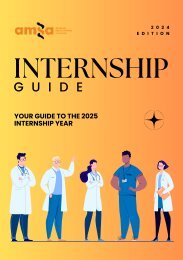Internship Guide 2020
The official guide to the 2021 Internship year. The 2020 Internship Guide was compiled entirely by medical students and junior doctors who have volunteered their time to ensure it is the most up to date source of information relevant to our final year medical students. We hope that the information within this guide will assist you in your internship application. Good luck, Class of 2020!
The official guide to the 2021 Internship year. The 2020 Internship Guide was compiled entirely by medical students and junior doctors who have volunteered their time to ensure it is the most up to date source of information relevant to our final year medical students. We hope that the information within this guide will assist you in your internship application. Good luck, Class of 2020!
Create successful ePaper yourself
Turn your PDF publications into a flip-book with our unique Google optimized e-Paper software.
Hello! My name is Victoria and I am currently an intern at the Royal Brisbane and Women’s Hospital. I am<br />
currently in week 14 into my internship and I have learnt a few things that I would like to share with you!<br />
I started internship knowing that it will be a huge learning curve. I went into it with the daily mantra of “make<br />
mistakes and learn”. I know, it’s quite different to the usual Type A and perfectionist attitude of a typical medical<br />
student. This was very important to me because I gave myself permission to fail and try again, which honestly<br />
lifted a huge burden from myself to know everything as an intern. The pressure was still present but knowing<br />
that it’s all a learning process helps it to be more enjoyable. Having this mentality made it easier for myself to<br />
ask questions to allied health and senior doctors, as well as having a go at managing a patient before seeking<br />
further help.<br />
An intern is sometimes equivalent to an “over glorified admin person”. This is very true. Your job is to write<br />
notes, fill in med charts, remember plans and make things happen. You are the glue between your team and<br />
the rest of the hospital, and you are oh so very important!<br />
Theory wise, you will forget everything you have learnt in medical school. And that’s okay. At the start of the<br />
year, I would stress out over relearning theories and understanding concepts. I dreaded attending clinics in<br />
case a patient asked me a difficult (or simple) question. What I realise is that by being in medical school for 4<br />
years, you will already have a higher health literacy than the common population. Your job is to actively listen<br />
to patients, build rapport and explain things in simple terms. Take a moment and be in the patient’s shoes. It<br />
must be scary being on the other side, and having a friendly face that listens without judging is very reassuring.<br />
“Referrals” is the dreaded R word in every interns’ vocabulary. We all have memorised “ISBAR” but yet, always<br />
freeze when it comes to an actual handover or referral. I have made some awful referrals (and will most likely<br />
will). What I would recommend is take your time. Breathe. Read through old notes and learn the patient’s story.<br />
There is a great referral cheat sheet online too and be prepared to answer questions that are specific to the<br />
specialty. Having AusLab, med charts and the notes in front of you is a must as an intern!<br />
The imposter syndrome is REAL. I felt it very much so in my first term, to the point whereby I hated being<br />
called “doctor” by the nurses, patients and anyone at all. Deep down, I felt like a 5th year medical student<br />
that happened to have a fortnightly Centrelink figure on crack. It can be an awful mental state to be in, as you<br />
know that patients depend on you for the right education and medication. What is important is to be gentle on<br />
yourself and that everyone is on the same boat, including the registrars and consultants!<br />
Finally, be kind to medical students. This means taking the liberty to reach out to the shy medical students on<br />
their first day, introduce them to the busy consultants, let them write in charts and so on. Remember, they will<br />
be your colleagues in the very near future!<br />
Dr Victoria Bong<br />
Royal Brisbane and Women’s Hospital (PGY1)<br />
57

















